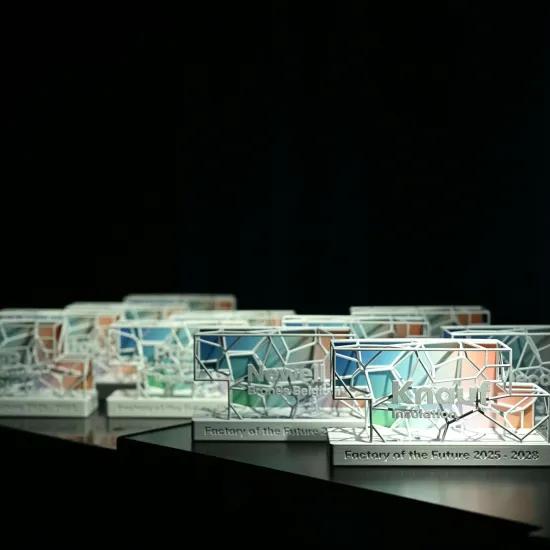Looking back on Manufacturing Day 2023
Manufacturing companies wanting to remain competitive, need to transform their production. To provide these companies with an insight into the latest technology trends and their impact on lead time, variety, quality and costs, Sirris organised Manufacturing Day 2023 on 23 November. The day featured practical demonstrations and enlightening testimonies of successful manufacturing innovations.
A competitive manufacturing industry is extremely important for a country or region (Europe) because it creates leverage to jobs in other industries and is a source of wealth and of innovation.
Challenges for manufacturing industry
Yet, it’s not smooth sailing for the Belgian manufacturing industry right now. Reasons include high wages, new challenges such as sustainability (not in the least circular and energy transitions) and the geopolitical situation. The current geopolitical situation is causing obvious supply chain disruption. The credo ‘we deliver quality’ is outdated, because countries like China and India have since evolved into producers of high-tech products.
Manufacturing companies strive to continuously optimise their production processes to remain competitive in a rapidly changing market. However, it is not easy today to keep up with all the new technologies and trends: not only is the range of possibilities extensive, but the impact of all these technologies is challenging to assess. In addition, companies often lack time and resources to follow up or test innovations.
The paradox of competitiveness and production systems
To remain competitive, companies need to transform. Producing as it was done 10 or 20 years ago, is no longer an option. However, competitiveness is an abstract concept, which is not always easy to put into practice in a manufacturing company. On the one hand, it is important to have a product range or service offering that meets (changing) customer demand. On the other hand, production must be organised in a way that enables a company to live up to the customer's key drivers - costs, lead time, delivery reliability, flexibility and quality. To be competitive, companies need therefore to produce cheaper, faster, with more flexibility ... An additional challenge is that these factors typically may oppose each other in a production system: higher quality may come with higher costs, greater flexibility comes with longer lead times, etc. As a company, it is not easy to make the right choices. Ideally, production should be organised in a way that breaks down these trade-offs.
Innovation in practice
While several companies are already fully committed to innovating their production, a large number of manufacturing companies are still hesitant to actually take the plunge. Companies find it difficult to correctly and realistically assess the actual impact of manufacturing innovation on competitiveness. Which digitisation projects should we start up? What impact can we realistically expect? How long does a manufacturing innovation process take? What is the expertise we need? Companies are struggling with all these questions and that is preventing them from initiating their own project. During Manufacturing Day 2023, we therefore presented four successful Industry 4.0 cases for inspiration. The business cases zoomed in on the real impact and the various practical aspects involved in optimising or digitising production.
The presentations addressed the needs of manufacturing SMEs and suggested answers to challenges faced by many companies, things that companies are concerned about.
Finger on the pulse during interactive session
‘What we think the manufacturing sector is concerned about, corresponds de facto to reality.’ We tested this statement during an interactive session with the manufacturing companies attending Manufacturing Day. We presented five questions and statements to the audience using Mentimeter. We will discuss the - sometimes surprising - answers, results and conclusions from this session in detail in a separate article that you can expect from us soon.
Four successful production cases
Kulapro provides custom joinery for professional customers (B2B). As a small company, it is not easy to stay competitive in an industry where every project is almost unique. Kulapro decided a few years ago to fully commit to digitisation, not only in production but also (and especially) for all supporting processes. In this presentation, Managing Director Bertrand Schrevens focused on how Kulapro, as a small company, tackled this journey and what impact it realised. It also zoomed in on the change management aspect (i.e. closely involving employees), which was indispensable for Kulapro in this project. Link to the case? -> Kulapro puts AR-based indoor navigation on construction sites | Sirris
b-token is a producer of personalised tokens and customised applications for the event sector. In addition to focusing on customisation, b-token is also deliberately investing in sustainability, both in its products and production. To efficiently produce custom tokens in small batches, significant investments have been made in digitisation in recent years. Via an online platform, the customer can upload files of the desired products and from then on, the next steps from control over work preparation and planning to actual production are completely digital. b-token also invested in innovative digital printing technology to remain competitive. In this presentation, Managing Director Nathalie Breugelmans focused on the path the company has taken and the results it has achieved.
Hegge Toelevering supplies, among others, sheet metal to the automotive sector, where strict quality requirements with defect rates lower than 10 ppm apply. Customer orders are processed entirely digitally. For Hegge, it is important to be able to draw up a reliable schedule for a cost- and time-efficient production with the available capacity (people and machines). To move away from the outdated (and inaccurate) standard process times, it developed a machine learning-based model to predict an accurate process time for each specific production order. This model takes into account not only the product and material parameters, but also the different machine operations and the operator. This presentation explained how this dynamic planning method was developed and implemented on the production floor, and its added value.
Alberts, a Belgian food robotics start-up, develops and builds vending robots designed to make personalised, fresh smoothies and soups. Now the initial challenges are behind, the company set up a local production centre in Belgium, enabling flexible, high-quality manufacturing. Although Alberts is fully scaling up, it still regularly encounters certain production issues. During the presentation, the focus was on how Alberts, through informed operational and strategic choices, is able to meet all these challenges.
Inspiring keynotes
Noël Slangen, General Director at POM Limburg, stressed the importance of productivity in his keynote 'How digitisation can make the manufacturing economy grow again', and that we need to remain competitive. It was a plea for companies today to approach certain things differently in the future. It is essential in this context to involve external knowledge (through cooperation. partners, companies, knowledge institutions), to have a long-term innovation planning, as well as a roadmap and vision for technology. He also focused on takeovers as a possible way to bring existing knowledge, technologies and services in-house: you do not have to invent everything yourself and acquisitions mean more speed in acquiring knowledge. Slangen also sees QRM (quick response manufacturing) as a means for companies to stay competitive. Finally, the implementation of new, digital technologies in the production process was discussed in this context.
With the keynote address ‘Change - are you giving up or looking ahead?’, Marc Herremans, founder of the To Walk Again Foundation, elaborated on how to deal with severe setbacks in life, both private and work-related. Setbacks and down days are a part of life for each of us. The art in life is to accept setbacks and see them as an opportunity to fight back and push boundaries. In this keynote, Marc Herremans demonstrated how to turn setbacks into opportunities, how to see setbacks as a challenge to innovate, for example, and how this stimulates creativity. The entire keynote was built around his own experiences and made the audience reflect on what really matters.
Want to know how to optimise your production and strengthen your competitiveness? Contact us!






